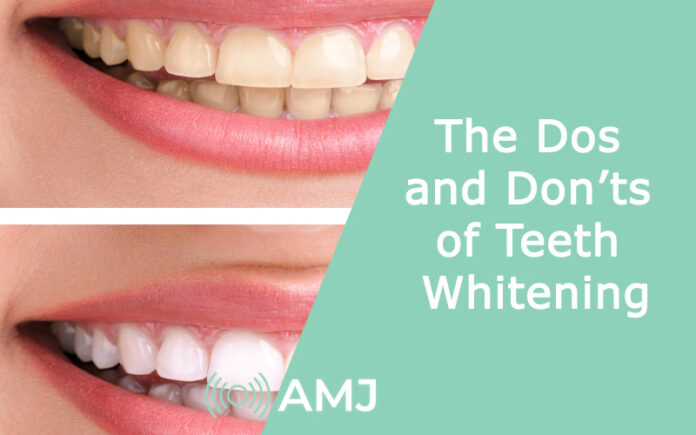Every person you come across will likely mention that they often draw their confidence from their smiles. And, one of the biggest parts of a smile is the teeth. There are thousands, if not millions of people across the world that struggle to keep their teeth white and pearly.
Teeth whitening has multiple approaches. You can get it done by an experienced and licensed medical professional or you can wing it yourself. We’d recommend you do the former for better and long-lasting results without damaging your teeth.
This post will walk you through all the potential dos and don’ts surrounding teeth whitening that you should keep in mind.
Contents
Dos of Teeth Whitening
Before we highlight what you shouldn’t be doing, let us start with the positive traits. Here’s a list of things you should do to maintain the health of your pearly whites.
1. Practice Good Oral Hygiene
Not just before your teeth whitening routines, it is crucial to practice good oral hygiene regardless. If you have a habit of not brushing your teeth two times a day or skipping flossing, we’d recommend you rectify those. The main reason why your teeth are stained is due to poor oral hygiene.
Plaque and tartar deposition and decalcification often lead to the staining, making your teeth look yellow or slightly brownish. A good part of oral hygiene also involves consulting a dentist every 6 months to get a professional cleaning of your oral cavity.
2. Get it done Professionally
There are hundreds of teeth whitening kits available in the market that are marketed for easy DIY whitening. However, they do come with a lot of complications and risks. You run into the risks of overdoing the whitening strip or you might use “cheaper” and “unreliable” products that strip off your enamel coating.
Instead, we’d suggest you get the procedure done professionally. Also, if you are getting it done by a dentist, consult the ones with a good reputation. This reduces the risks of damage to the teeth and ensures every tooth is cleaned thoroughly.
Don’ts of Teeth Whitening
Once you do get teeth whitening, there are certain don’ts you should be aware of. They include:
1. Avoid Citrus Fruits
It is a common misconception that eating lots of citrus fruits has “bleaching” properties on the teeth, making them looks whiter. That isn’t always the case. When your teeth have been exposed to the whitening chemical agents, they are already highly sensitive. If you expose acidic and citrus fruits during that, it can strip off the natural enamel coating on top of the teeth.
This makes your teeth more susceptible to staining after the procedure. Your dentist should give you detailed instructions about your diet after the procedure to avoid staining. With the right measures, you should be able to keep your teeth white for a good few months.
2. Avoid Dark Foods
By dark foods, we mean coffee, tea, etc. The tannins and caffeine in these beverages can easily stain your teeth after the whitening procedure. So, entire effort that your dentist has put into cleaning and whitening your teeth will go to complete waste. Not just after, avoid consuming “staining” foods before the procedure too.
As we mentioned, avoid acidic fruits and foods at all costs. That is what contributes to the most damage. Also, in case you do consume them, wait for up to 30 minutes and then gently brush and floss your teeth to minimize the damage you have likely imposed.
3. Maintain the Frequency
Too much of anything is bad for you. The same applies to teeth whitening as well. When you whiten your teeth every few months, you are chemically treating your teeth frequently, which can lead to damage to the upper layer or the enamel. The most your enamel erodes, the more sensitive your teeth become.
This can lead to hot or extreme cold sensitivity, so you will face issues consuming food and beverages. Indulge in the teeth whitening process once every year. It’s more than enough to keep your teeth in the best appearance for up to a year, provided you aren’t eating “staining foods” a lot.
4. Customization isn’t Always the Best
We live in a world where we think that everything can be DIY-ed. And, while you can do them to an extent, we wouldn’t recommend experimenting with your teeth. Several formulas call for baking soda, salt and lemon juice as “natural bleach” for your teeth. While they might give you a temporary whitening effect, they can be bad for your teeth in the long run.
Most of these abrasive ingredients are bad for the teeth’s enamel. Not just erosion, they damage the structure of the teeth too. So, avoid experimenting with different “whitening” agents and ingredients thinking they would work.
5. Avoid doing it yourself
Besides the natural ingredients, we’d recommend that you avoid teeth whitening at home. Those whitening strips and the blue light that you find heavily marketed on the internet by various influencers come with their fair share of complications and side effects.
Hence, we’d recommend that you look for alternatives instead. The best choice would be to consult a professional and certified dentist. They use the right chemicals, know what’s best for your teeth and align the treatment for maximizing the good for your oral health. When you do it yourself, there are a lot of side effects involved in the process.
Teeth whitening should be done once every six months or once a year. It is an effective procedure that can restore the beauty of your pearly whites. However, you need to understand that “extremely white” teeth are nearly impossible due to the kind of diets we consume. We eat and drink a lot of staining foods that leave a cast on our teeth. So, having slightly discolored teeth is normal and affects a lot of people globally. There’s nothing that you should be ashamed of in that case.












![Index of Money Heist [Season 1, 2, 3 & 4 – All Episodes, Cast and Plot] Index of Money Heist](https://www.asiamediajournal.com/wp-content/uploads/2021/05/Index-of-Money-Heist-3-100x70.jpg)